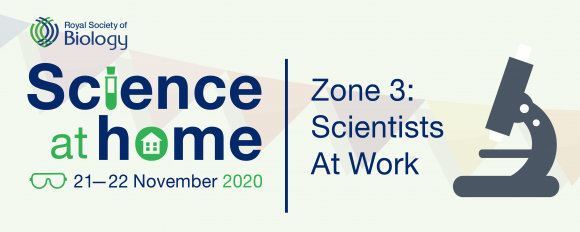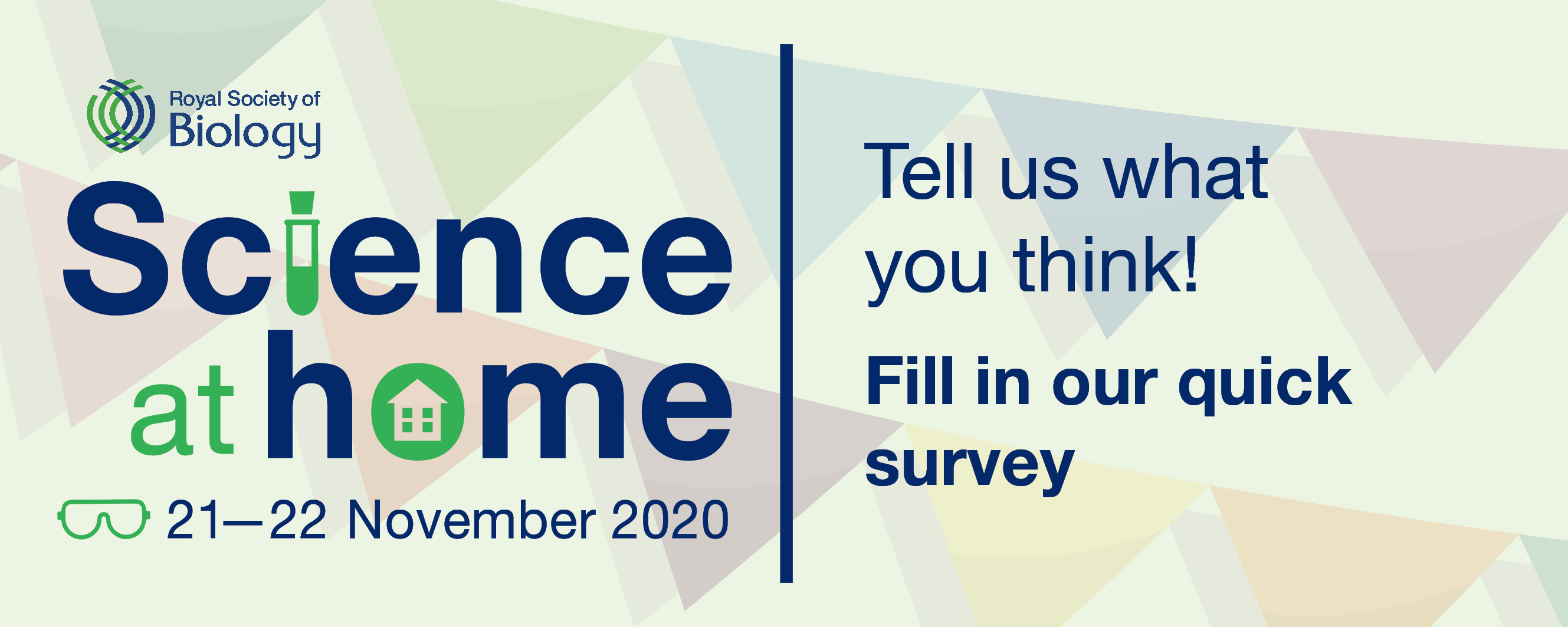Zone 3: Scientists At Work
Welcome to Zone 3 of Science at Home!
This zone is full of interviews and short films about what it is like to be a scientist. We've got researchers from all areas of science talking about the research they are doing, their career paths, achievements, what inspires them and more.
A must watch for anyone considering a career in science.
You can view a playlist of all of our Zone 3 videos below, or keep scrolling to choose any individual videos that take your fancy.
We hope you are enjoying Science at Home!
Share any photos of activities of you in action by tagging @RoyalSocBio on Twitter, Facebook and Instagram, and check out more videos on our YouTube channel.
Sir David Attenborough: biology changing the world | Royal Society of Biology
Sir David Attenborough, world famous naturalist and broadcaster, discusses a wide range of topics, from what originally sparked his interest in the natural world, how to become a science communicator, to the increasingly important role biologists play in the 21st century.
Take a virtual lab tour | Understanding Animal Research
The reality of a modern animal research laboratory might not be what you imagine.
Take this interactive virtual tour of the Oxford primate facility and discover the reality behind the myths and hear from the people who work with and care for research animals every day.
A day in the life of three vets | The Royal Veterinary College
Follow three young vets as they explain what a typical day for them looks like, in three very different locations!
Working in wildlife and disease prevention with Dr Steve Unwin | Association for the Study of Animal Behaviour
Dr Steve Unwin works at the University of Birmingham and is involved in research into health and ecosystem health, from a non-human animal perspective, including the health of apes in their wild habitats.
This includes research into zoonotic diseases of concern (human and wildlife) and the risks these pose.
Where can ecology take you? | British Ecological Society
Are you interested in working with nature? You can find out more about the many different careers in ecology in this leaflet. From research to conservation and education, there is job for everyone with a love of the natural world!
A day in the life of a scientist | British Society for Gene and Cell Therapy
Watch the hard working team of Imperial College London scientist working tirelessly through their day while performing a series of cool experiments.
Ask an Animal Scientist | Easter Bush Science Outreach Centre, University of Edinburgh
At the University of Edinburgh's Roslin Institute and Royal (Dick) School of Veterinary Studies, scientists and vets work to improve the lives of animals and humans by studying animals of all shapes and sizes including bees, oysters, salmon, chickens, cats, dogs, sheep, pigs, cows, horses and more!
Feel free to ask a question about animal science or what it is like working in science. Answers will be posted via the Easter Bush Science Outreach Centre Twitter using #AnimalSciQ.
Interview an ecologist | Field Studies Council
Have you ever wondered about the kinds of careers that are out there in practical science?
FSC tutor Jo Harris speaks to some amazing scientists about how they got into their field of expertise and how important their work is.
From ocean acidification research, to forensic botany we talk to some fascinating people.
Working as a forensic botanist with Dr Mark Spencer
Working as a marine ecologist with Dr Louise Cameron
Working as an environmental monitoring officer with Josie Maclaren
Working as an ecological advisor with Rachel Hamilton
Working as a research assistant in marine ecology with Chiara Bertelli
Arctic charr research | Fisheries Society of the British Isles
Antony Smith is a PhD student at Bangor University, and FSBI member. His work focuses on a population of Arctic charr in the idyllic Llyn Padarn in North Wales.
Antony can be found snorkelling the frigid waters, counting eggs and capturing fry in his home-made fry traps. Data collected from this project will go towards helping protect charr habitat.
Mangrove ecosystems of Florida | Fisheries Society of the British Isles
Kirthana is an FSBI funded PhD student, and she tells us a bit about her work in the mangrove ecosystems of Florida.
She examines food webs in these diverse systems, capturing fish, and examining what they have eaten. Her journey begins with seine netting her sample fish.
Careers in physiology - Exercise physiology | The Physiological Society
Kimberley Murray, a Great Britain skeleton athlete, sports scientist and exercise physiologist, discusses her career and what her job entails.
Careers in physiology - Extreme physiology | The Physiological Society
Heather Massey, lecturer in the department of sport and exercise science at the University of Portsmouth discusses her varied career in exercise physiology.
Careers in physiology - Physiology in industry | The Physiological Society
Joanne Storey is a senior director at GSK, UK. She talks about how the study of physiology has led to her role in pharmaceutical research and development, and within that, drug discovery.
Careers in physiology - Physiology in healthcare | The Physiological Society
Naoise Ó Ciardha, lead clinical perfusion scientist at Royal Brompton Hospital, talks about his career.
The Shark Diary | The Physiological Society
Follow a research team who spent over two weeks in the Arctic Ocean trying to understand the biology of the Greenland Shark.
Professor Dame Anna Dominiczak on precision medicine | Royal Society of Edinburgh
Professor Dame Anna Dominiczak is Regius Professor of Medicine (the first woman to hold the position) and Vice-Principal and Head of the College of Medical, Veterinary and Life Sciences at the University of Glasgow.
Professor Dame Anne Glover on science & policy | Royal Society of Edinburgh
Professor Dame Anne Glover is a Scottish biologist, academic, and current President of the Royal Society of Edinburgh. Watch as she explains what science means to her and why she is so passionate about the field.
Dr Anuschka Miller on protected marine areas | Royal Society of Edinburgh
Dr Anuschka Miller works with the Scottish Association for Marine Science, Scotland’s largest and oldest independent marine science organisation.
Watch as she explains the tools that help to improve marine conservation in Scotland.
Professor David Price on brain organoids | Royal Society of Edinburgh
Prof David Price is Professor of Developmental Neurobiology at the University of Edinburgh's Centre for Discovery Brain Sciences. Watch as he explains what brain organoids are, why scientists would want to make them, and their uses in science.
Professor Deborah O’Neil on antibiotics | Royal Society of Edinburgh
Professor Deborah O'Neil is a biotechnologist with over two decades of experience in the field of anti-infectives research & drug development.
She is the current Chief Executive Officer and Scientific Officer at NovaBiotics.
Professor Eva Hevia on synthetic chemistry | Royal Society of Edinburgh
Eva Hevia is a Professor of Organometallic Chemistry at the University of Strathclyde, Glasgow and Professor at the Department of Chemistry and Biochemistry, the University of Bern.
Lewis Hou on the science of music | Royal Society of Edinburgh
Lewis Hou is an interdisciplinary education and cultural participation specialist, the founder of the Science Ceilidh, and the recipient of the RSE Innovators Prize for Public Engagement 2018.
Professor Ian Jackson on genomes | Royal Society of Edinburgh
Professor Ian Jackson is the Head of Medical and Developmental Genetics at the MRC Human Genetics Unit at the Institute of Genetics and Molecular Medicine, University of Edinburgh.
Professor Niamh Nic Daéid on forensic science | Royal Society of Edinburgh
Professor Niamh Nic Daéid is an Irish forensic scientist, the Professor of Forensic Science and Director of Research at the University of Dundee.
Professor Becky Lunn on bioengineering | Royal Society of Edinburgh
Professor Becky Lunn is the Head of the Centre for Ground Engineering and Energy Geosciences at the University of Strathclyde.
Professor Nicola Stanley-Wall on microbiology | Royal Society of Edinburgh
Nicola Stanley-Wall is a Professor of Microbiology in the School of Life Sciences at the University of Dundee who works on the molecular mechanism of biofilm formation. Watch as she explains her work around Bascillus subtilis.
Prof Dame Anne Glover on why she became a scientist | Royal Society of Edinburgh
Professor Dame Anne Glover is a Scottish biologist and academic; she was Professor of molecular biology and cell biology at the University of Aberdeen before being named Vice Principal for External Affairs and Dean for Europe.
She served as Chief Scientific Adviser to the President of the European Commission from 2012 to 2014, and in 2018 she joined the Principal's senior advisory team at the University of Strathclyde.
What lives at the bottom of the deep Greenland sea? | Zoological Society of London
Meet Research Fellow Dr Chris Yesson and hear all about his work - featuring carnivorous sponges, iceberg collisions and the oldest vertebrate in the world!
Why champion the less loved creatures? | Zoological Society of London
Research Fellow Dr. Monika Böhm, lover of the under-appreciated species explains just how you work out how endangered a species is, and why freshwater creatures need a lot of conservation attention.
From field work to animal farts... | Zoological Society of London
Post Doctoral Researcher and popular science author Dr. Dani Rabaiotti, expert on all things African wild dog (and also animal farts), discusses her career from writing an autobiography at the age of ten to a New York Time Bestseller in 2017!
Do sharks use oyster cards? | Zoological Society of London
Research Fellow Dr. David Jacoby discusses sharks and the technology used to explore the behaviours of these toothy fish. Also, listen to David's great advice on why to nurture your skills alongside your passion.
How can satellites help save animals? | Zoological Society of London
Senior Research Fellow Dr Nathalie Pettorelli explains how satellites can help with conservation, and why she works to amplify female voices in science. Watch for tips on how to find your place in science and to hear how conservation took Nathalie to NASA!
Enjoyed your time exploring?
Please let us know how you have found RSB's Science at Home by filling in our quick survey.



